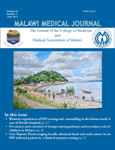
|
Malawi Medical Journal
College of Medicine, University of Malawi and Medical Association of Malawi
ISSN: 1995-7262
Vol. 30, No. 3, 2018, pp. 159-161
|
 Bioline Code: mm18033
Bioline Code: mm18033
Full paper language: English
Document type: Research Article
Document available free of charge
|
|
|
Malawi Medical Journal, Vol. 30, No. 3, 2018, pp. 159-161
| en |
A preliminary investigation of the effects of labour inducing plant, Cissampelos mucronata  , on the outcomes of pregnancy using rat models , on the outcomes of pregnancy using rat models
Lampiao, Fanuel; Maliwichi-Nyirenda, Cecilia; Mponda, John; Tembo, Lackson & Clements, Carol
Abstract
Background
The use of traditional remedies in pregnancy has been associated with bad obstetric outcomes including uterine rupture and foetal
distress. These outcomes may ultimately lead to maternal and child mortality or morbidity. Few studies have been done to measure the
effects of various herbs in pregnant women or a developing fetus. This study investigated the effects of the commonly used labour
inducing plant, Cissampelos mucronata, on pregnancy outcomes using a rat model.
Methods
Pregnant female rats were divided into 3 groups of 10 each. The first group was the control. The second group was treated with the
aqueous extract of Cissampelos mucronata at mid-pregnancy. The third group was treated with Cissampelos mucronata close to full term.
All the groups were left to give birth and outcomes were recorded.
Results
Rats treated at mid-term had significantly low number of pups when compared to the control group as well as the close to term
treated group (4.1 ± 0.54 vs. 6.4 ± 0.60; 6.2± 0.56). The mid-term treated rats had pups with significantly lower body weight when
compared to the control and the close to term treated groups (3.73 ± 0.36g vs. 5.37 ± 0.16g; 4.27 ± 0.1g). The average gestation
period was significantly short in the mid-term treated group when compared to the control and the close to term treated groups
(18.16 ± 0.50 days vs. 20.40 ± 0.44 days; 20.12 ± 0.37 days). There were no uterus ruptures observed in all study groups 3 days after
delivery.
Conclusion
Administration of Cissampelos mucronata during pregnancy leads to early induction of labour.
Keywords
herbal medicine; pregnancy; labour; maternal mortality
|
| |
© Copyright 2018 - The College of Medicine and the Medical Association of Malawi
Alternative site location: http://revista.uft.edu.br/index.php/jbb/index
|
|
